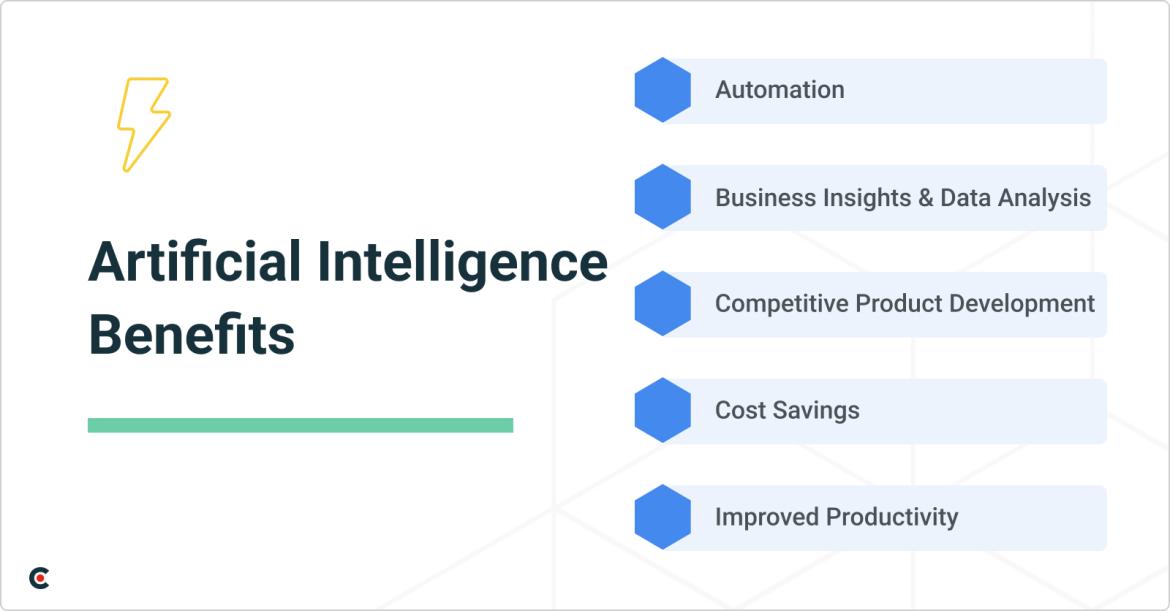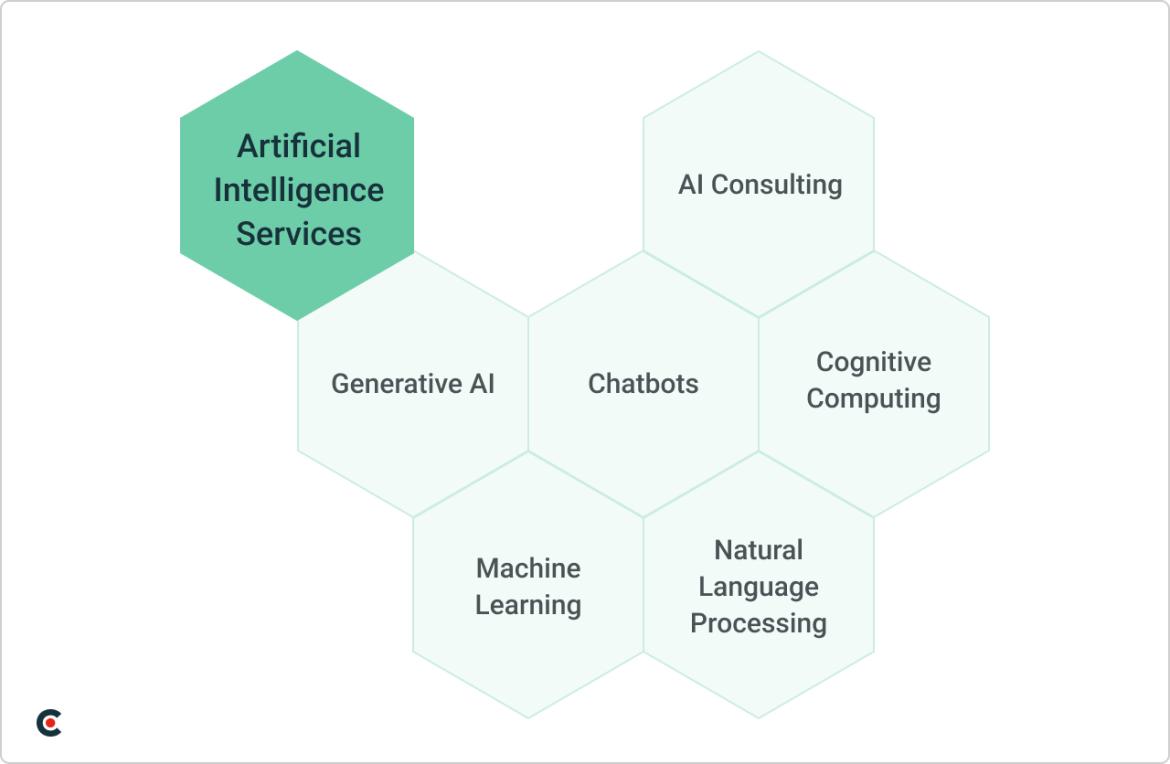Updated February 23, 2026
Integrating the right artificial intelligence tools or solutions can transform businesses, allowing them to accelerate their growth and achieve their goals. AI has become integral in surpassing different challenges, streamlining repetitive tasks, and reducing operational costs.
Artificial intelligence (AI) has the power to drive business growth, allow informed decision-making, and adapt to modern-day demands. AI can be the catalyst for different innovations; that’s why businesses are scrambling to invest in the best solutions to help advance their goals.
At their very core, artificial intelligence companies are committed to helping their clients leverage AI by offering key services such as predictive analytics and business intelligence. These service providers are equipped with the skills, technical expertise, and tools needed for projects of all sizes.
AI is as complex as it goes. The technology has evolved greatly throughout the years, and it’s still progressing because of different innovations. In this detailed Clutch hiring guide, we'll break down everything you need to know when considering the ideal AI partner. Keep reading to know the various focus areas and services offered by these dedicated service providers.
Browse Related Focus Areas
What is Artificial Intelligence?
Artificial Intelligence: the technology that allows computers and machines to simulate human intelligence processing and problem-solving. It works by processing large amounts of data, recognizing data correlations and different patterns.
The research and development for the technology began decades ago, starting with computer programs training to mimic basic human reasoning. Fortunately, groundbreaking technological advancements have helped AI technology become more accessible for businesses.
AI requires a broad range of development techniques and methodologies because of its complexity and sophistication. In fact, there is no singular programming language synonymous with AI development. Depending on the scope, features, and functions, developers can use Python, R, C++, Java, and more.
Additionally, AI has various subsets depending on the application, type of function, and scope. Examples include machine learning, deep learning, robotics, and neural networks.
The right AI solutions can offer unprecedented help for businesses looking to improve their efficiency, enhance productivity, and reduce costs. The ideal artificial intelligence company will be able to provide invaluable knowledge and expertise to help businesses implement world-class solutions. They can offer a range of services tailored to your needs, from expert consultation to intricate development.
Artificial Intelligence Services by Country
Artificial Intelligence Services by City
5 Benefits of Artificial Intelligence
Businesses leveraging AI solutions can unlock different advantages that can give them the edge they need to conquer their market. Applying the right AI tools can offer the following benefits:

- Automation and Improved Productivity: Efficiency is the name of the game when running a team. Freeing your employees from repetitive tasks by automating and streamlining crucial processes can lead to better productivity, reduced operational costs, and minimized human errors. Relieving your staff from time-consuming responsibilities will allow them to focus on their core competencies and responsibilities.
- Business Insights and Data Analysis: Artificial intelligence gives businesses real-time access to large amounts of important data, providing quick and accurate insights to help make crucial business decisions. The information can also help drive business growth, allowing businesses to stay ahead of the curve and compete in this current data-driven business landscape.
- Enhanced Customer Experience and Satisfaction: AI-powered products and experiences give an impactful experience to customers. Today, businesses can leverage different AI tools such as Chatbots, personalization features, and recommendation engines to make a lasting impression on customers. These creative and meaningful engagements help foster loyalty and satisfaction, driving greater revenue growth.
- Competitive Product Development: One of the biggest benefits of AI is its ability to help businesses identify crucial gaps in the market and create new products, solutions, or services to address them. Through AI tools such as predictive analytics, companies can accelerate their growth by anticipating market trends and understanding customer demands. The insights they’ve gained can also help improve existing products and services, adapting to the ever-changing market environment.
- Cost Savings: Artificial intelligence can help businesses save costs through various means such as operational automation, predictive maintenance, and risk mitigation. As AI becomes more accessible for businesses of all sizes, the potential of saving resources by applying the right tools increases.
What Services do Artificial Intelligence Companies Provide?
Dedicated artificial intelligence companies offer a vast array of services and expertise that can provide value to companies. They can play key roles in helping businesses harness the technology’s power by developing customized solutions, integrating AI into their operations, and more. Here are the main services offered by these service providers:

- Generative AI
- AI Consulting
- Chatbots
- Cognitive Computing
- Machine Learning
- Natural Language Processing
- Robotics
Generative AI
Generative AI, or gen AI, is one of the many subsets of AI and its main focus is creating various data or content by simplifying or classifying existing information. It’s a form of deep learning and it's among the biggest breakthroughs in the AI field.
ChatGPT is the most popular example of generative artificial intelligence. It’s a free tool that allows end users to create content such as texts, images, codes, or even audio. It can also allow users to engage in human-like conversations at an incredibly high level of detail.
Unlike traditional AI, gen AI is among the closest to resembling human-creative thinking. At its core, gen AI uses algorithms designed to identify, understand, and classify patterns in data that are statistically closely related to their origin.
While gen AI has raised important concerns and conversations about the creative industry, when applied ethically, it has the power to enable new forms of expression.
AI Consulting
AI consulting plays a key role in helping companies identify gaps and maximize AI for their respective goals. AI consultants essentially provide expert guidance and strategic advice to businesses in need. They have the in-depth knowledge and expertise needed to fully leverage AI technologies for various objectives.
Usually, AI consultants have a structured process to analyze the business and understand its needs. Depending on their needs, an AI consultant typically starts by assessing the current business processes, infrastructure, and data assets. They conduct a thorough evaluation to break down a case in order to provide helpful recommendations.
AI consultants can work on both one-time and long-term projects. They can develop a comprehensive strategy to help their clients integrate the right AI tools that align with their business priorities, defining the scope and timeline of the plan.
Chatbots
AI chatbots are intricate computer programs designed to simulate human conversations and interact through texts. They traditionally started with predefined scripts that are suggested by inputting keywords on prompts.
Throughout the years, AI chatbots have become more sophisticated as technological innovations allowed them to interpret user input by understanding messages even without keywords.
Chatbots are typically used by businesses across different industries to automate customer support, mostly handling basic concerns and questions. An example of this is the chat pop-ups that appear on websites asking end users if they can assist with anything on the platform. Other than that, more advanced chatbots can also be used in a variety of functions such as lead generation, virtual assistance, and appointment scheduling.
Cognitive Computing
Cognitive computing is an interdisciplinary subset of artificial intelligence that refers to systems that simulate human thought processing and reasoning to solve problems. It’s a model that focuses on learning from interactions, creating intelligent systems that will eventually make similar decisions the way humans do.
Common applications of cognitive computing are for visual assistants like Google Assistant, Siri, and Alexa. Those AI-powered functions use natural speech for input and through their expansive knowledge databases, they generate conversational responses.
Another example of cognitive computing application is by how retail companies like Amazon create personalized product recommendations for their customers. The technology is used to understand the purchase history, viewed pages, and interests of the consumers in order to provide better suggestions that they would likely purchase.
Machine Learning
Machine learning (ML) is another subset of AI, and they’re often mistaken for one another. This subset focuses on developing algorithms and statistical models that will allow computer programs to learn, record data, and make predictions based on the data. The more data it records, the better the model functions.
There are three main types of ML — supervised, unsupervised, and reinforcement learning. They are differentiated by the type of data used to train the program.
Businesses can leverage ML by automating tasks, analyzing large amounts of complex data, and extracting crucial insights to make better decisions. Just like with any other subset of AI, ML is still evolving as more developers revolutionize the technology to meet modern market demands.
Natural Language Processing
Natural language processing (NLP) is a subset of AI that refers to the interaction of computers and human languages. It focuses on allowing computer systems to understand, interpret, and simulate human language.
NLP combines different subsets of AI and development approaches to train systems on large volumes of data on human language. The training process uses data to understand semantics, language structures, grammar, and patterns. The solutions are created to recognize context and handle nuances.
Robotics
Robotics focuses on developing intelligent machines that can autonomously perform tasks. Traditionally, robots were programmed to perform specific tasks by following predefined rules but AI technology has revolutionized robotics.
AI-powered robots use complex algorithms, sensors, and hardware to perform tasks while perceiving the environment, independently making decisions, and adapting to real-time conditions.
Because of its potential, AI robotics are maximized across different industries worldwide. Robots can be seen serving and staffing restaurants in the restaurant and hospitality industries. They are also used by scientists and astronauts for space exploration and astronomy.
How to Assess Artificial Intelligence Services
As business owners, it’s only natural to expect a return on investment and want to see how the vendor performs.
There’s no one way to assess the impact of AI services because it will depend on the type of solution, parameters, and model you need. Usually, clients follow three structures when evaluating AI services — classification metrics, regression metrics, and AI ethics metrics.
Classification Metrics
Classification metrics are used to assess the performance of AI models, usually for binary and multiclass classification. Typically, these metrics take into account these main KPIs:
- Accuracy: the ratio of true results among the total volume of cases examined. It considers both true positives and true negatives and it’s often used for classification problems.
- Precision: the ratio of correct prediction among negative predictions generated by the model.
- Recall: otherwise known as sensitivity, this measures the ratio of true positives divided by the sum of true positives and true negatives.
- AUC-ROC: stands for area under receiver operating characteristics, measures the probability curve that plots the true positive rate of the model against the false positive rate.
- F1 Score: is the harmonic mean of precision and recall metrics, and is a measure of predictive performance.
Regression Metrics
Regression metrics are the KPIs used to evaluate regression models that involve predicting the numeric value. These metrics take into account the following KPIs:
- Mean absolute error (MAE): the average absolute difference between the predicted values and the actual values, providing insights into the model’s occurrence.
- Mean squared error: the average squared difference between the predicted and actual values.
- Root mean squared error (RMSE): the square root of the MSE and its expression using the same units as the target variable.
Ethics Metrics
Ethic metrics are used to evaluate the ethical implications and considerations of the AI solution. These are crucial to mitigate unethical practices in AI development. Examples include:
- Societal impact takes into account the broad implications in societies, economies, and cultures. It factors digital divide, economic inequality, and social biases.
- Fairness determines the disparity predicted by the model across different demographic groups such as gender, sexuality, race, and age.
- Accountability evaluates the responsibility of AI systems, measuring the extent to which the solution is liable for its outputs or actions it performs.
- Privacy evaluates the extent to which the AI model protects the confidentiality and privacy of the data in compliance with protection regulations.
- Transparency assesses the interpretability of AI models and the degree to which they can be understood by humans.
What is an Artificial Intelligence Team?
Artificial intelligence companies are full-service vendors that specialize in creating, implementing, and maintaining AI solutions. These companies work closely with businesses and organizations that want to develop customized AI tools, integrate AI solutions into their business, or improve their existing systems.
The typical AI team is composed of the following professionals:
- Data scientists: These professionals are in charge of developing and deploying advanced algorithms and models. They have in-depth expertise in data analytics, machine learning, and statistical modeling.
- AI researchers: Professionals who are responsible for analyzing the problem, conducting thorough research, and staying updated with the latest AI technologies. They should have a well-rounded understanding of AI and its subsets.
- Software engineers: These team members are in charge of the technical build and development of the software infrastructure needed to support the AI model.
- Machine learning engineers: They are focused on creating and optimizing intricate machine learning learning algorithms and models for deployment. These professionals have high-level expertise in relevant programming languages like Java and Python.
- AI consultants: They provide unbiased and strategic guidance to businesses looking to improve their AI integration or leverage the technology for their objectives. They allow the clients to navigate through the extensive discovery, development, implementation, and maintenance stages.
- QA engineers: These professionals are responsible for conducting meticulous testing and validation for the AI models. They ensure everything is of high quality and that issues are identified immediately.
What to Look For When Hiring an Artificial Intelligence Company
Before committing to a project with an artificial intelligence company, it’s important to critically evaluate different factors to ensure you’re matched with the right partner. Since AI has several subsets and applications, the criteria will depend on your project and priorities.
To make the selection process easier, sit down with your team to discuss your project and understand the different elements that matter to you.
Criteria For Hiring an Artificial Intelligence Company
- AI expertise and experience
- Good track record working with previous clients
- Team skills and composition
- Development approach and methodology
- Security and compliance
- Costs and pricing structure
- Geographic location
Evaluating service providers before hiring them ensures that they can accommodate your needs and deliver top-notch solutions. Having personalized criteria will not only help you see if they have good experience but also determine whether they can bring value that aligns with your strategic goals.
Lastly, track records should always be considered. Client reviews from independent B2B resources such as Clutch can help give crucial insights into the performance of service providers and their relationships with their clients. By thoroughly looking through their client feedback, you can quickly spot potential red flags that can hamper your project’s success.
10 Questions to Ask When Hiring an Artificial Intelligence Company
- What AI technologies and methodologies does your team specialize in?
- Can you describe your AI development process?
- How do you ensure strict data privacy and security compliance for the project?
- Can you walk us through examples of similar AI projects you’ve done in the past?
- What is your stance on ethical AI development?
- How do you ensure your AI models are ethical and unbiased?
- What support and maintenance service can we expect from your end after deployment?
- How do you test the integrity of your AI models?
- How do you stay updated on the latest AI developments?
- Are my expected timeline and budget realistic for my project?
Interviewing potential partners is the best way to narrow down your options and identify the right team for your project. Make sure you’re prepared beforehand by outlining your requirements and researching important questions.
During the interview, actively listen to their answers and pay attention to the depth of their expertise. Consider how they answer your questions and concerns to gauge their communication skills and style.
Ultimately, it’s up to you to determine whether they’re the right fit. Every project is unique, that's why it’s essential to match with the ideal provider that best fits them.
AI is Part of the Present and Future of Business
The impact of artificial intelligence can’t be denied. It’s here to stay as part of the present and future of businesses across the globe. The unparalleled advantages should be embraced to drive further innovation.
The process of searching and matching with the right AI company may seem tedious but it will set the foundation for your project’s success. Leverage the insights you’ve gained from this hiring guide to find the perfect AI partner that fits all your considerations.
Once you’ve laid out your specific criteria and priorities, browse through Clutch’s directories for the leading AI companies. Maximize the filters we’ve prepared to quickly cut through the clutter and confidently go through our collection of client reviews to help your search.
















